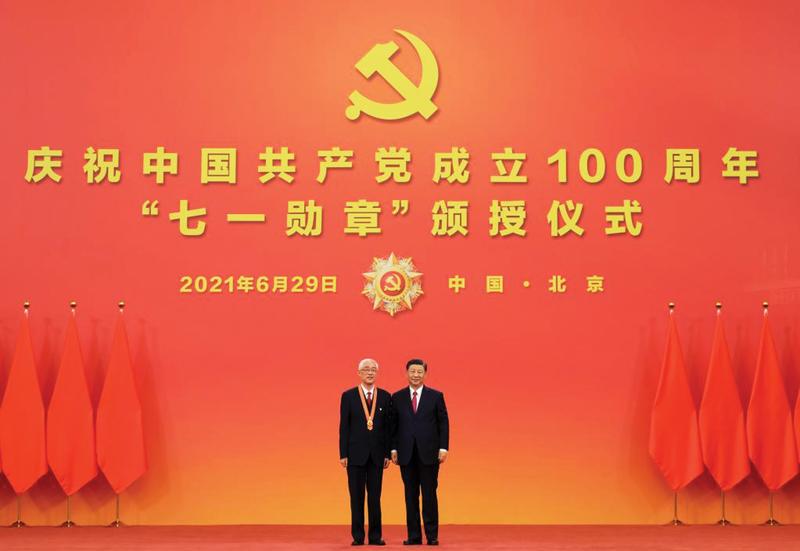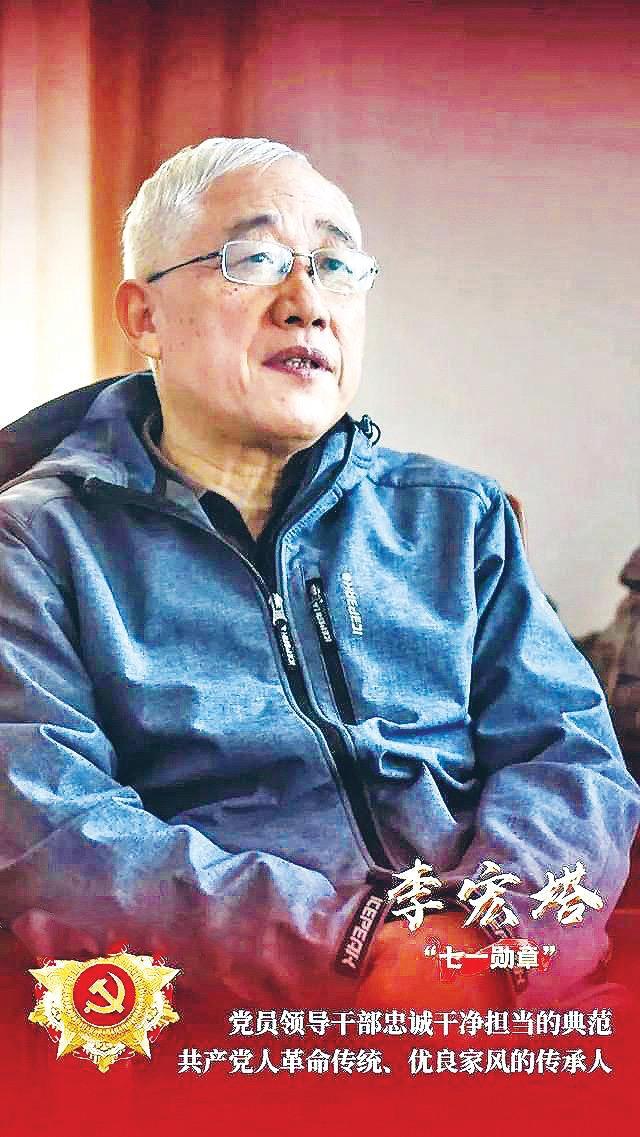 President Xi Jinping presents the July 1 Medal, the Party’s highest honor, to Li Hongta at the award ceremony in Beijing on June 29. (PHOTO / XINHUA)
President Xi Jinping presents the July 1 Medal, the Party’s highest honor, to Li Hongta at the award ceremony in Beijing on June 29. (PHOTO / XINHUA)
Looking back, the allegations against Li Hongta were bizarre to say the least, but they helped deliver one good outcome: total vindication of the government official’s conduct after a scrutiny of his work activities.
Sometime around 2005, China’s disciplinary authorities received anonymous letters calling for an investigation into Li, suggesting that the senior official may have been involved in corruption and bribery and amassing lot of properties.
Li was accused of taking advantage of his post as the director of the Civil Affairs Department of Anhui province and also misusing his family background — Li’s father, Li Baohua, once served as Party secretary of Anhui province and had also been governor of the People’s Bank of China; while his grandfather, Li Dazhao, was one of the early founders of the Communist Party of China — to enrich himself.
The Central Commission for Discipline Inspection, or CCDI, the top supervisory organ of the CPC, took note of the letters and immediately established an investigation team. The team was dispatched to Anhui province, without letting the relevant departments of the province know in advance.
After weeks of meticulous and intensive investigation, the team found that the allegations against Li Hongta were totally unfounded. Instead, what they discovered was that the actual situation was completely the opposite. Li was not a corrupt official at all; he had been an upright and decent official just like his father and grandfather.
After the investigators reported their work back in Beijing, the main person in charge immediately instructed that Li be used as a role model for publicity.
On July 3, 2005, the official newspaper of the CCDI published a full-page news report in which it described the conduct of Li Hongta, as the third-generation successor of Li Dazhao, as being in line with that of his illustrious family members. Numerous examples were cited to showcase the official’s personal integrity and sense of responsibility.
Throughout his life as a Party cadre, Li Hongta seldom paid any attention to worldly pleasures. He does not smoke or drink any alcohol, let alone going to the karaoke halls or other places of entertainment.
“I think, whether a person is ‘rich’ or not depends more on the spiritual aspect,” he once said in a media interview. “And the material aspect is not that important.”
Born in 1949, Li Hongta was the third child of Li Baohua and his wife Tian Yingxuan. He enlisted in the army at the age of 16. After leaving the military, he worked at a major chemicals factory in Hefei. In 1973, he enrolled as an electrical engineering major at Hefei University of Technology. Upon graduation three years later, he returned to the chemicals factory as a technician.
He joined the CPC in 1978, the same year when he was appointed deputy secretary of Hefei Municipal Committee of the Communist Youth League, and later to the deputy secretary of Anhui Provincial Committee of the Communist Youth League. In 2008, he was elected vice chairman of the Anhui Provincial Committee of the Chinese People’s Political Consultative Conference.
Some years ago in Hefei, the capital of Anhui province, a sturdy and tall middle-aged man with gray hair was always seen riding a bicycle on the bustling Changjiang Road and Lu’an Road, joining the multitudes who commuted to and from work daily.
That person was none other than Li Hongta, as he rode a bicycle to work for years.
 Li Hongta says that he is determined to continue to pass on Li Dazhao’s good family traditions, and move forward in the footsteps of his ancestors. (PHOTO / XINHUA)
Li Hongta says that he is determined to continue to pass on Li Dazhao’s good family traditions, and move forward in the footsteps of his ancestors. (PHOTO / XINHUA)
According to Li’s wife, during his time as a Party official for over 20 years, Li had worn out four bicycles, five raincoats and seven pairs of rubber shoes. As he got older, he finally switched from bicycle to an electric motor car in 2003, saying that he was “advancing with the times.”
As a matter of fact, Li was not only used to riding a bicycle, but also to living in a cramped setting. Despite being a prominent Party cadre, Li lived in an apartment measuring less than 60 square meters in size, with little decoration, only old-fashioned furniture, and few electrical appliances.
An 8-square-meter aisle, where an old-fashioned table was placed, acted as both his living and dining room. “You have to walk through it by leaning to your side,” said Li. The most fashionable item in his house was a three-seat wooden sofa made in the 1980s, half occupied by clothes and half by books.
Li had presided over the distribution of public housing units for ten years after he was transferred to the Department of Civil Affairs of Anhui province as the deputy director in 1987. “I had allocated nearly two hundred sets of houses and I never asked one for myself,” he recalled.
Under relevant policies, Li could have got a house allocated for his own use, but every time he gave away the opportunity, as he noticed that many younger colleagues had poor housing and felt that their needs were more important.
“In 1998, I ignored my wife’s complaint and gave up the last opportunity for housing allocation.”
As the person in charge of civil affairs in Anhui, Li had the interests of the entire local community at heart. In the province there were 1.7 million recipients of special care, 640,000 retired soldiers and 3,400 retired cadres from military, 48,000 rural five-guarantee households (the aged, the infirm, old widows and orphans taken care in five ways including food, clothing, medical care, housing and burial expenses), as well as some urban disadvantaged groups.
There were 900,000 people living in “subsistence allowances” households, 5 million disabled people, and more than 15,000 homeless people receiving subsidies.
As Anhui was an important province in the country’s rural tax and fee reforms, Li did his best to guarantee the benefits of the 48,000 five-guarantee households during the process.
Since Anhui is located on a transitional climate zone between North and South China, floods and droughts occur nearly every year, so Li had to devote himself to disaster relief efforts regularly.
Li did not have much savings — it was reported that only 10,000 yuan (US$1,547) was in his bank account when he retired.
Many people in Li’s department knew that his name often topped the list of people making donations. Li would not hesitate, for example, to offer monetary help when saw a house of the “five guarantee households” leak, or when he saw that the quilt of an elderly person in a “welfare house” was too thin. He was generous in helping the disabled people or the laid-off workers that he met.
“For me, helping other people in need is … great happiness,” Li said.
This reminds people of his grandfather, Li Dazhao, who was the director of the library and a professor at Peking University, earning a decent salary in those days. But Li Dazhao’s family still led a poor life, because he often used his salary to finance poor students and fund Party affairs.
To support the family, Cai Yuanpei, then president of Peking University, had to hand part of Li Dazhao’s salary directly to his wife.
Li Dazhao’s son, Li Baohua, also lived a simple life that was hard for most to imagine. His apartment was in a building constructed in the 1970s, which had only old plywood furniture, chairs covered by artificial leather, and a sofa that would sink when somebody sat on it.
In 2000, the relevant central authorities wanted to improve the housing conditions for him. Li Baohua said: “I am used to living (in it) now, and I’m getting old, so there is no need to change.”
“My father inherited his father’s noble qualities and good family traditions. There are no rules set (by him) for us; (it’s) more about practicing, and teaching, by example,” said Li Hongta.
After Li Baohua passed away in 2005, somebody asked his son: “How much did you inherit from your father?” Li Hongta answered, “We don’t need any inheritance. As descendants of Li Dazhao, it suffices for us to have spiritual legacy.”
Li Hongta also wrote in his memoir: “Although my grandfather died early, he left a rich revolutionary heritage and precious spiritual wealth. The family tradition of being upright and diligent he established has lasted for nearly a hundred years and passed on for several generations.”
“My parents have carried on the good family traditions left by my grandfathers. Among our brothers and sisters of the third-generation, none of us have ‘big money’, but everyone is proud of our hard work and simple life.”
As the CPC celebrated its centenary last week, Li Hongta was among those honored with the July 1 Medal, the highest Party honor, as top leader Xi Jinping presented the medals to outstanding CPC members.
A total of 29 people received the honor, including three who were awarded the medal posthumously.
The citation recognized Li Hongta as a Party loyalist known for his great moral integrity and a keen sense of responsibility.
China Discipline Inspection and Supervision Daily and Dangjian Magazine contributed to the report.


